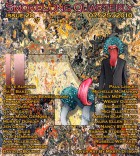One thing I really loved about your story “Complicit” is its simplicity of language. It seems every single word counts here. I’m curious what your process was for writing the story. Did you write it longer and pare it down, or did it come out mostly this way?
Thanks, Tara. I love playing with language and find it exciting to talk about. When I was teaching, I ran across an essay by Richard Lederer called “The Case for Small Words.” It’s greatly influenced my style, especially in the writing of flash fiction.
“Complicit,” originally called “In the Grain,” was written for the online journal Six Little Things for its monthly prompt. Their word limit is 250 words. My subconscious usually helps me out when I write toward a word limit. Sounds funny, doesn’t it? But I believe it. It’s something like “muscle memory” in dance and sports: if you perform a certain action over and over again, eventually it becomes automatic. When I have a limit, I get this little nudge to my brain asking, “Uh, where the heck are you going here? Better figure it out and do it.” It’s amazing how often I’m within 10 percent either way with the count.
My story wasn’t selected, but I liked what I had, so I asked a few friends to review it. I got some excellent notes. I reviewed what everyone said. Sometimes when I get comments, I take the offered advice. Sometimes I see the sticking point, but come up with a different solution. And sometimes, I decide the reader just missed it. This happens.
For “Complicit,” the notes led me to figure out the purpose for the story—I had no idea when I first drafted it—and how I could enhance that purpose through structure and language. What I saw in the story was how we set things in motion and sometimes can’t stop them. How inertia sets in, freezing us in place.
How do you come up with your story ideas? Does it start with a character, a situation, a theme? Is it different every time?
When I first started writing, one of my fears was that I had nothing to write about. I think that’s common. But the trick was to allow myself to write about anything and everything, to sit down and GO, and see what happened. Once I gave up the preconception that a starting idea has to be a good idea, ideas came from everywhere. That’s the surprise, the miracle: seeing who that character in the jury room turning balloons into monkeys might become in a story.
For me the question is always, does this idea have juice? Sometimes I’m excited about a title that’s come to me or a place I’ve been and think there might be something there. Then I lose it. Other times the idea sticks and sticks and later it bumps up against another idea and together they turn into something larger (kind of like bubbles can). Many ideas come from prompts, books I’m reading, People Magazine, and it seems the less I care about the end result—say, I’m just doing a riff on a prompt to be goofy—the better the piece. That is until it’s time to revise and edit.
So I don’t really think about ideas, at least, not on purpose. I follow along with my writing plan for the day, jotting down miscellany from here and there, working on revising this or that, and boom, something works, or boom, the day is over and I’ve got a lot of unfinished business. I can’t always predict what will end up revised, polished, and submitted.
You also did the artwork that compliments your story, and I notice on your web site you list yourself as a ‘jewelry-maker.’ Can you tell us more about your other creative hobbies? What inspires you? Which is your favorite?
LOL!!! When I quit teaching in 2007, my head exploded. My first priority: get something published!!! Because that was one of the reasons I’d retired. And I did, but when I happened to go to Tucson for the Gem and Mineral show, all those shiny sparkly stones got to me. I played with beads for a while, but I didn’t want to put in the time to get really good—sell it in a boutique good—so it became a hobby and I started to paint! I’d always thought I was more of a painter than a writer, but that was just more of the exploding with creativity syndrome. I gained another hobby. In the end, I think of myself as a writer. I write, therefore I am, with apologies to M. Descartes.
Can you talk a little about your chapbook and the process of putting together a collection? How hard was it to choose stories and come up with a theme?
I entered a couple of chapbook contests unsuccessfully, picking a theme for the second one, hoping it might give me an edge. I had about six “mother-daughter” and a seventh that had the word “mother” in it. So that part was easy.
I liked the name Pomegranate, alluding to the seeds Hades gave to Persephone (pomegranate with seeds/book with stories) when Demeter insisted on her daughter’s return, but nothing in the collection reflected the myth. I had to write something to earn the title. Two idea bubbles came together, People Magazine’s article on the kidnapped Jaycee Dugard and the Greek myth of Demeter’s loss of Persephone.
What are you reading, watching, listening to these days that you are loving?
Oh dear! I just finished listening on CD to Dan Chaon’s Await Your Reply and started Jeffery Deaver’s The Bodies Left Behind. On my nightstand is Howard Gardner’s Creating Minds (I’m on Picasso right now), listening on my iPod to Johnny Lang, Jack Johnson, a little Tom Waits, and watching 500+ episodes of Law and Order (TIVO-ed and tracked from a downloaded episode list ) as well as Cold Case and Without a Trace. New TV passion: Southland. And I loved Alice in Wonderland, but didn’t really care for 3-D.




 The SmokeLong Grand Micro Contest (The Mikey) is now an annual competition celebrating and compensating the best micro fiction and nonfiction online.
The SmokeLong Grand Micro Contest (The Mikey) is now an annual competition celebrating and compensating the best micro fiction and nonfiction online.